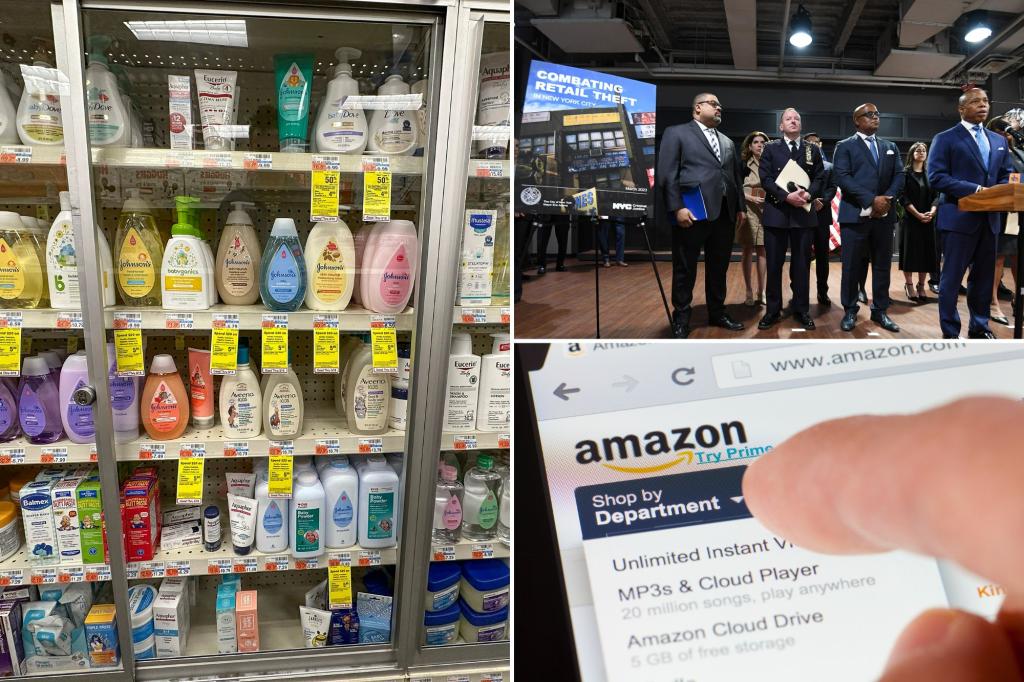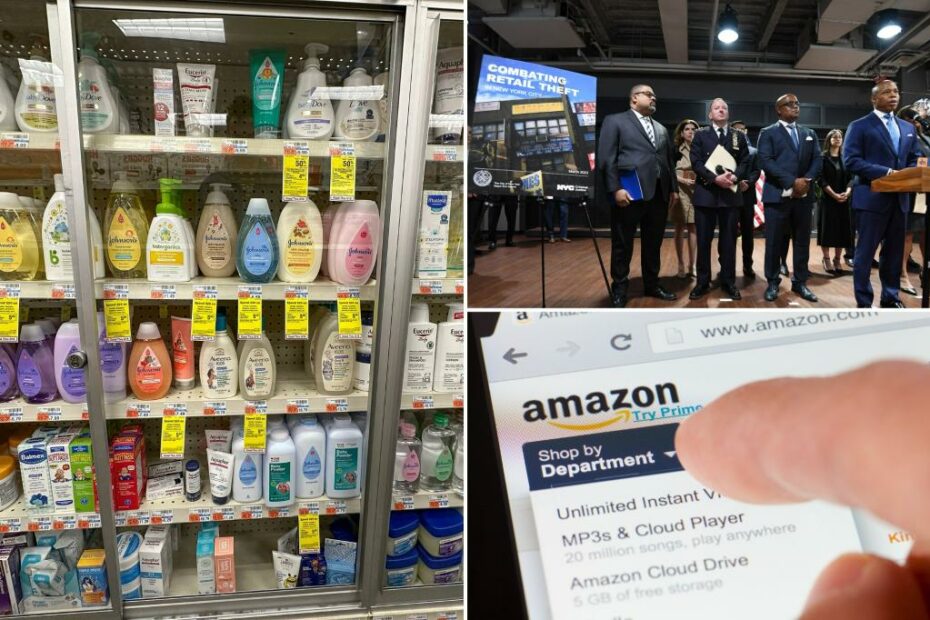Law targeting organized retail crime takes effect, but how much will it help?
INFORM Act Takes Effect in Effort to Combat Organized Retail Crime
The Integrity, Notification, and Fairness in Online Retail Marketplaces (INFORM) for Consumers Act, a new law aimed at curbing the sale of illicit goods by organized retail crime groups on online platforms, officially went into effect on Tuesday. The bipartisan legislation, supported by retailers and law enforcement agencies, is designed to protect consumers from counterfeit, unsafe, and stolen products sold by bad actors on online marketplaces such as Amazon or Facebook.
The National Retail Federation reports that organized retail crime has become a major issue plaguing the industry, with thefts in 2022 alone amounting to a staggering $95 billion. To address this problem, the INFORM Act now requires online marketplaces to collect, verify, and disclose specific information from third-party sellers who conduct at least 200 transactions resulting in total revenues of $5,000 in a year. Marketplaces will need to obtain and verify sellers’ bank account numbers, government-issued identification, tax identification numbers, and contact information. Additionally, certain details such as sellers’ names and contact information must be made available to consumers to facilitate reporting of suspicious activity on the platform.
According to David Johnston, Vice President of Asset Protection and Retail Operations for the National Retail Federation, the INFORM Act will improve communication between online marketplaces, law enforcement agencies, and the retail community. For the first time, consumers, retailers, and law enforcement officials have the power to report any suspected noncompliance with the law to the Federal Trade Commission (FTC), which will conduct investigations into the marketplace. Failure to comply with the legislation can result in fines of up to $50,120 per violation levied by the FTC.
Johnston believes that the INFORM Act will unveil the identity of sellers and remove the anonymity and uncertainty that has previously surrounded online marketplaces. Although industry experts do not expect this legislation to single-handedly solve the problem, they see it as a crucial initial step in combatting organized retail crime. Johnston adds that while the law may assist in dismantling local or regional criminal groups, it may have little impact on larger, well-structured transnational organizations that make millions through the resale system.
Retailers who have been grappling with the rise of organized retail crime also view the INFORM Act as an important starting point. Evelyn Fornes, spokesperson for Home Depot, urges Congress and states to enforce the new law, allocate funding for law enforcement task forces, and educate officials on partnering with retailers to combat criminals and organized crime.
Home Depot and Amazon, two major players in the online retail space, have already taken steps to address this issue even before the legislation came into effect. Home Depot has been collaborating with federal and state task forces to mitigate organized retail crime, while Amazon has implemented robust processes and tools to vet and monitor sellers in its store.
Walgreens, which expressed support for the INFORM Act when it was introduced last year, hopes that the legislation will empower state attorneys general to enforce its provisions and urges all states to prioritize tackling organized retail crime by funding dedicated task forces to prosecute criminal rings operating in their communities.
Overall, the INFORM Act represents a significant effort to curtail organized retail crime and protect consumers from purchasing counterfeit, unsafe, or stolen goods on popular online marketplaces. While its full impact remains to be seen, stakeholders in the retail industry are optimistic that this legislation will serve as a crucial first step in combating this growing problem.
FAQs:
Q: What is the purpose of the INFORM Act?
A: The INFORM Act aims to combat organized retail crime by making it more difficult for such criminal groups to sell illicit goods on online marketplaces. It requires these platforms to collect, verify, and disclose specific information from third-party sellers and helps protect consumers from counterfeit, unsafe, and stolen products.
Q: How will the INFORM Act be enforced?
A: If a consumer, retailer, or law enforcement agency believes that an online marketplace is not complying with the law, they can report it to the Federal Trade Commission (FTC), which will conduct investigations. Noncompliance with the legislation can result in fines of up to $50,120 per violation imposed by the FTC.
Q: Can the INFORM Act completely solve the issue of organized retail crime?
A: While industry experts believe that the INFORM Act is a positive step forward, they do not expect it to single-handedly solve the problem. The legislation may help dismantle local or regional criminal groups, but larger, well-structured transnational organizations may still pose a challenge.
Q: How do retailers feel about the INFORM Act?
A: Retailers who have been impacted by organized retail crime welcome the INFORM Act as a crucial initial step. They emphasize the importance of enforcing the law, funding law enforcement task forces, and educating officials on partnering with retailers to combat criminals and organized crime.
Q: What measures have already been taken by retailers in response to organized retail crime?
A: Even before the INFORM Act came into effect, retailers like Home Depot and Amazon had been implementing measures to address organized retail crime. Home Depot has been working with federal and state task forces, while Amazon has developed robust processes and tools to vet and monitor sellers in its store.

Newly Implemented Law Combatting Organized Retail Crime: Assessing Its Potential Impact
The Integrity, Notification, and Fairness in Online Retail Marketplaces (INFORM) for Consumers Act went into effect on Tuesday, aiming to tackle the sale of illicit goods by organized retail crime groups on platforms such as Amazon and Facebook. The bipartisan legislation mandates that online marketplaces take measures to protect consumers from counterfeit, unsafe, and stolen products. This law is part of ongoing efforts to combat the widespread issue of organized retail crime, which cost the industry and communities $95 billion in 2022, according to the National Retail Federation.
Beginning Tuesday, online marketplaces will be obligated to collect, verify, and disclose specific information from third-party sellers who conduct at least 200 transactions resulting in total revenues of $5,000 per year. This includes obtaining and verifying sellers’ bank account numbers, government-issued identification, tax identification numbers, and contact information. Furthermore, sellers’ names and contact information must be disclosed to consumers so that they can report any suspicious activity on the platform.
David Johnston, vice president of asset protection and retail operations for the National Retail Federation, explained that the INFORM Act will enhance communication between marketplaces, law enforcement, and the retail community. For the first time, consumers, retailers, or law enforcement who suspect a marketplace of non-compliance with the law can report it to the Federal Trade Commission, which will investigate the matter. Failure to comply with the legislation can result in fines of $50,120 per violation for online marketplaces.
Historically, online marketplaces have been perceived as anonymous and uncertain in terms of identifying sellers, said Johnston. However, through the verification and validation requirements of the INFORM Act, this anonymity will be removed not only for investigators but also for consumers, he added. Although industry experts do not anticipate the law to completely solve the issue of organized retail crime, they agree that it is a promising first step.
Johnston acknowledged that it is too early to determine the full impact of the INFORM Act, stating, “It’s a single step in the journey to curbing the organized retail crime that we’re seeing and the increase in threats.” He also noted that while the legislation may help dismantle local or regional organized groups, it may not have a significant impact on larger, well-structured transnational groups making millions through the resale system.
Retailers facing the growing threat of organized retail crime, which is becoming increasingly sophisticated, agree that the INFORM Act is only the beginning of addressing the issue. Home Depot spokesperson Evelyn Fornes emphasized the importance of enforcing the law, providing funding for law enforcement task forces, and educating authorities on partnering with retailers to combat organized crime. Home Depot has been actively working with federal and state task forces to mitigate these crimes.
An Amazon spokesperson expressed support for the nationally consistent expectations established by the INFORM Act, stating that it will benefit small businesses selling products online by avoiding a patchwork of state-level regulations. The company noted that it has already implemented comprehensive processes and tools for vetting and monitoring sellers in its store, demonstrating its commitment to customer and seller trust.
Walgreens, which backed the legislation upon its introduction, believes the INFORM Act will empower state attorneys general in enforcing its provisions. The company encourages states to prioritize the fight against organized retail crime by funding dedicated task forces to prosecute criminal rings operating within their communities.
